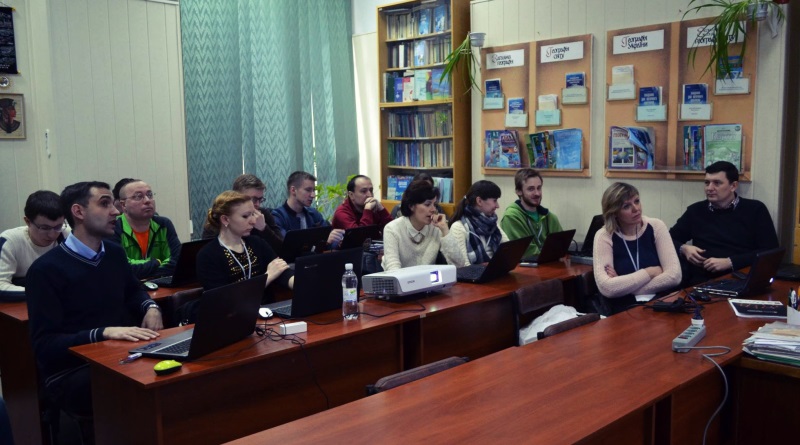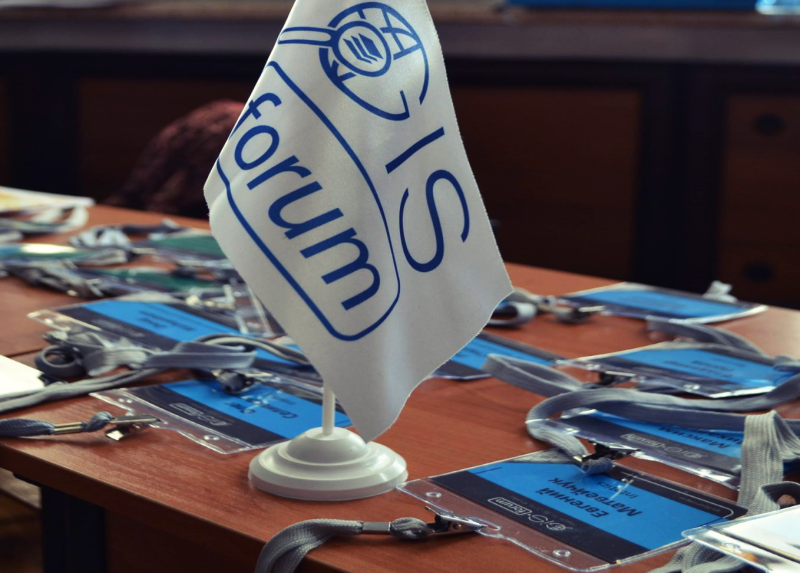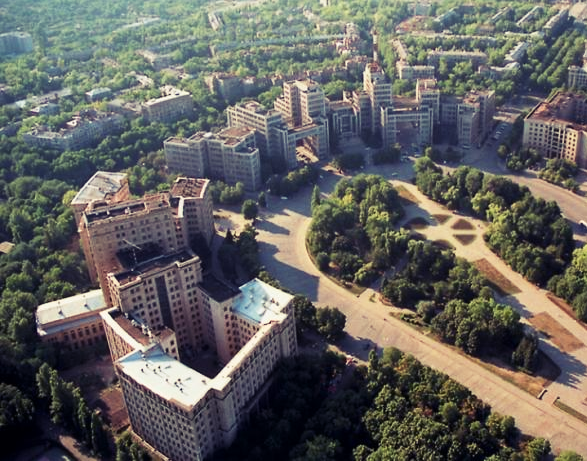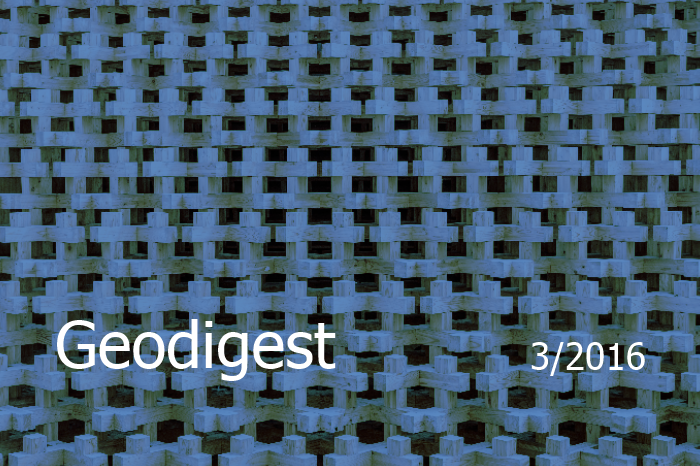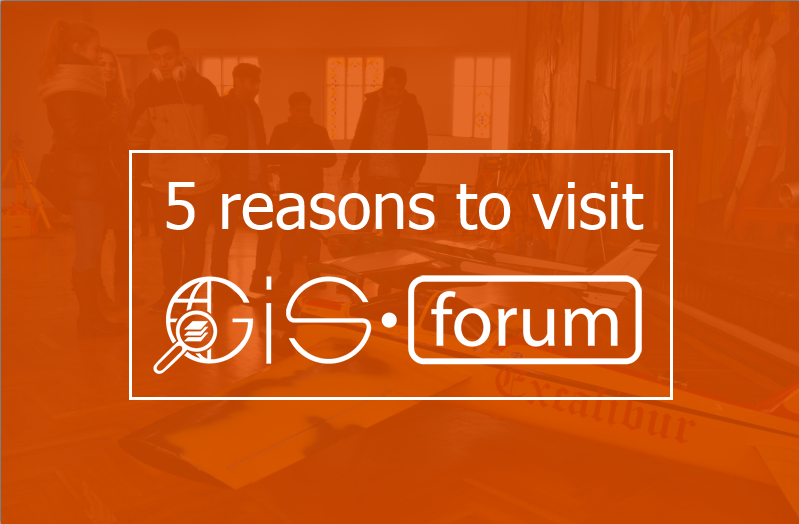
Минулого тижня у Харкові проходив ГІС-форум – платформа для геоспілкування про освіту, науку та виробництво у нашій галузі. Ось невеликий огляд від Ярослава Смірнова, що більш за все описує атмосферу заходу.
ГІС-форум 2016 завершився, і цей пост пишеться в потязі, що повільно, але впевнено, прямує зі Сходу на Захід. Як і переважна більшість людей, що цікавиться ГІС, я знав про ГІС-форум від моменту його заснування (тобто з 2012-го року). Але завжди знаходилась маса причин (відмазок), чому не вдавалося його відвідати. Цього ж року мені вдалося пересилити ганебне бажання сидіти вдома і нарешті зібратися та вирушити до Харкова.
Після завершення форуму я зрозумів, що попередні роки мені не вистачало якогось остаточного мотиватора, щоб відвідати ГІС-форум. Тому хай цей пост стане “листом у майбутнє” для всіх, хто в наступному році буде вагатися, чи варто брати участь у ГІС-форумі (бо я то вже точно збираюсь їхати на ГІС-форум 2017).
1. Немає рівних
Перша причина, чому потрібно їхати на ГІС-форум, може бути і останньою просто тому, що, якщо ви цікавитесь ГІС і не хочете виїжджати за кордон, то альтернативи харківському форуму немає. Звісно, є ряд конференцій географічного, картографічного, геодезичного спрямування з окремими ГІС-секціями, заходи, які проводяться ГІС-компаніями, формальні та неформальні зустрічі ГІС-користувачів. Але всі ці івенти все ж таки є достатньо вузько спрямованими. На конференціях у ГІС-секціях подаються доповіді з дослідженнями різної тематики, у яких у кращому випадку використовувався ГІС-аналіз (а в гіршому – просто є якась карта). Конференції, які проводяться ГІС-компаніями, з очевидних причин тяжіють до продуктів та рішень, що просуваються цими компаніями, і часто більше нагадують рекламні акції (якими вони по суті і є). Зустрічі користувачів ГІС, незважаючи на надзвичайну корисність, достатньо короткі та стосуються якихось окремих аспектів ГІС-технологій або проектів.
ГІС-форум об’єднує в собі формати всіх згаданих вище заходів та переводить їх на якісно новий рівень. Це пояснюється тим, що на форумі збираються як науковці, так і представники виробництва, та всі інші, хто використовує, розробляє, продає, навчає або просто цікавиться ГІС. Відповідно, розпочинається діалог, тематика якого крутиться навколо “ГІСів”. Завдяки тривалості (цього року – 4 дні), різноманітності представників та грамотно сформованій і організованій програмі ГІС-форум фактично стає єдиним масштабним заходом, присвяченим саме ГІС-технологіям у різних їх проявах.
2. Майстер-класи
Цього року на ГІС-форумі було проведено вісім майстер-класів. І якби ці заходи виносились у окрему подію комерційного характеру, то мені навіть складно уявити, скільки б коштувала реєстрація на неї. Бо авторами майстер-класів стали дійсно лідери галузі (як іще можна назвати розробників ядра QGIS або одного з головних модераторів проекту OSM Україна?!).
Більше того, ті майстер-класи, які я відвідав, перевершили мої очікування, тому що на них не просто механічно демонструвався алгоритм роботи з програмами (таке ж можна і на ютубі подивитись), а відбувався живий діалог зі спікером. Саме цього найчастіше не вистачає при опануванні якогось нового ПЗ, і ніякі відео уроки, туторіали чи скайп конференції не зрівняються з можливістю тицьнути пальцем у монітор і запитати: “А ось ця штука що робить?”.
Наступного року особисто мені хотілося б відвідати ще більше майстер-класів. Так, надзвичайно цікаво в день Освіти (ГІС-форум поділений на три дні: Виробництво, Наука, Освіта) приймати учать у майстер- класах з викладання практичних занять з ГІС. Тому що одна справа – слухати про методики викладання у вигляді доповіді, а зовсім інша – відчути їх на власному досвіді.
3. Дружня атмосфера
Галузь ГІС є порівняно молодою як історично, так і за віком задіяних у ній людей. Відповідно, для сфери ГІС загалом та особливо для ГІС-форуму характерні “горизонтальні”, а не “вертикальні” зв’язки. Простіше кажучи, поруч із вами може сидіти хтось зі статусом “ГІС-бог”, що у якійсь “поважнішій/старішій/серйознішій” галузі перебував би на високій трибуні президії та, в кращому випадку, сказав би кілька слів у пленарній сесії. Тут же у ви можете, маючи мінімально прокачану навичку, починати розмову першим, підійти до людини і мучити її питаннями, які просто так нагуглити не вдасться. І магія ГІС-форуму проявляється в тому, що ця людина замість того, щоб втекти від різних дилетантських питань, дійсно почне відповідати на них і навіть пропонувати свою допомогу у їх вирішенні.
4. Організованість
Той, хто думає, що проведення конференції – це просто, і для цього достатньо зібрати гроші та роздрукувати бейджики, скоріше за все, не організовував нічого складнішого, ніж зустріч за пивом. Роботу, проведену організаторами ГІС-форуму, інакше як титанічною не назвеш. Виставка геодезичного обладнання, доповіді, майстер-класи, конкурс ГІС-проектів, змагання ГІС-спеціалістів, круглі столи, відео-конференції – і це навіть не повний перелік елементів програми форуму. А тепер додайте до цього необхідність реєстрації учасників, підготовки роздаткових матеріалів і допомоги всім гостям у знаходженні потрібних аудиторій у непростому плануванні університету Каразіна. Тільки тоді вам стане зрозумілим, що організація такої події як ГІС-форум може конкурувати у складності з організацією весілля на 300 осіб у будинку, у якому проходить ремонт та який розташований неподалік діючого вулкану.
Але організатори форуму відмінно справилися з поставленими завданнями: доповіді починалися вчасно, люди не губилися в коридорах університету, відео-трансляції велися, а круглі столи не переростали у безпредметні вправляння у риториці. Звісно, насиченість програми форуму інколи завдавала майже фізичного болю, бо дуже складно обрати між доповіддю людини, виступ якої давно хотів послухати, і майстер- класом на тему, якою нещодавно почав цікавитися. Але тут мене рятувала думка: “Добре, що все пропущене можна буде подивитись на ютубі” (а це знову ж таки дещо говорить про рівень організації заходу). Тому фактично весь ГІС-форум можна назвати одним великим майстер-класом із проведення конференцій, який тривав чотири дні.
5. Харків як місце проведення
Остання, але однозначно важлива причина відвідати ГІС-форум – це саме місце його проведення. Я вперше був гостем Харкова, і мене вразила масштабність міста, енергійність та завзятість його мешканців. Як сказав мій сусід по харківському хостелу: “Харьков – это место силы”. І я цілком із ним в цьому погоджуюсь. Усі ці риси Харкова дуже пасують усій ГІС-галузі, і тому за усієї моєї ніжної любові до Києва, Львова, Одеси, Чернівців та десятків інших прекрасних міст, саме Харків найкраще підходить для проведення головного ГІС-івенту року. Можна навіть сказати, що Харків окрім того, що носить ім’я “Першої столиці”, також став ГІС-столицею України (на що натякає навіть назва цього блогу).
І звісно, це навіть не повний перелік причин, з яких варто їхати на ГІС-форум, але інші причини я пропоную дізнатися самостійно. Правда, для цього доведеться в березні наступного року запланувати поїздку до Харкова 😉

